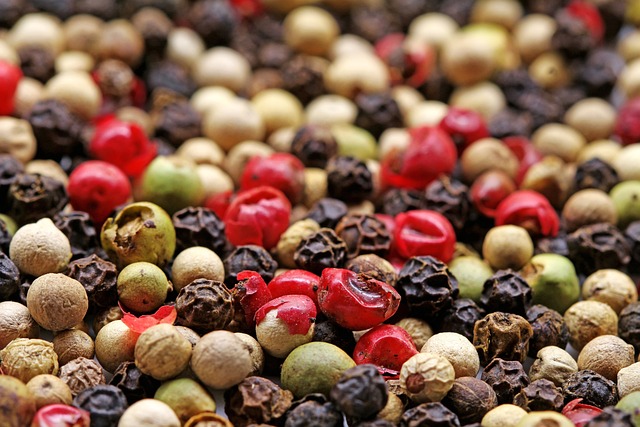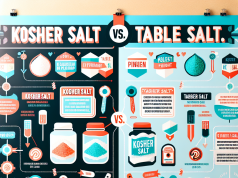Contents
Cooking with Black Pepper: Tips and Techniques for Enhancing Flavor and Nutrition
Black pepper is a versatile spice that adds a unique depth of flavor to various dishes. This humble spice not only enhances the taste of your food but also offers numerous health benefits. In this article, we will explore different tips and techniques to make the most of black pepper in your cooking.
Flavor Enhancement: Black pepper is known for its robust and pungent flavor, which adds a delicious kick to both savory and sweet dishes. Whether you are preparing a hearty soup, a zesty salad dressing, or a decadent dessert, black pepper can elevate the taste profile and create a memorable dining experience. Its subtle heat and earthy notes complement a wide range of ingredients, making it a versatile choice for spice lovers.
Nutritional Benefits: Beyond its remarkable flavor, black pepper also offers several health benefits. It contains a compound called piperine, which has been shown to boost nutrient absorption and improve digestion. Additionally, black pepper is rich in antioxidants that help fight free radicals and reduce inflammation in the body. By incorporating black pepper into your meals, you can enhance both the taste and nutritional value of your dishes.
Techniques for Using Black Pepper: To fully harness the flavor and benefits of black pepper, it is essential to know the right techniques for using it in your cooking. One simple way is to freshly grind black peppercorns just before using them. This ensures maximum flavor and aroma, as pre-ground black pepper can lose its potency over time. You can use a pepper mill or mortar and pestle to grind the whole peppercorns to your desired coarseness.
Another technique is to experiment with different cooking methods. For example, sautéing black pepper briefly in oil or butter before adding other ingredients can intensify its flavor. Similarly, dry-roasting whole black peppercorns in a pan over low heat can enhance their aroma and taste. By toasting the peppercorns lightly, you can bring out their essential oils and elevate the overall flavor profile of your dishes.
Conclusion: Cooking with black pepper is a delightful way to enhance the flavor and nutritional value of your meals. With its distinctive taste and versatile applications, black pepper can elevate any dish, from simple weeknight dinners to elaborate gourmet recipes. By following the mentioned tips and techniques, you can master the art of using black pepper and create delicious and wholesome meals for yourself and your loved ones.
Table of Contents
- Health Benefits of Black Pepper
- Buying and Storing Black Pepper
- Cooking Tips for Using Black Pepper
- Delicious Black Pepper Recipes
Health Benefits of Black Pepper
Black pepper is not only a staple spice in most households, but it also provides various health benefits. It contains a compound called piperine, which has been found to have antioxidant and anti-inflammatory properties. These properties make black pepper beneficial in improving digestion, increasing nutrient absorption, and even boosting metabolism. Regular consumption of black pepper may also help in alleviating respiratory problems and improving brain function. To learn more about the health benefits of black pepper, check out our detailed post.
Buying and Storing Black Pepper
When it comes to purchasing black pepper, there are a few factors to consider. Always opt for whole peppercorns instead of pre-ground pepper for the best flavor and quality. Look for peppercorns that are uniform in size and have a strong, aromatic scent. It’s recommended to buy black pepper from a reputable source to ensure freshness.
To store black pepper, keep it in an airtight container away from direct sunlight and heat. Whole peppercorns can last for several years if stored properly, while pre-ground pepper tends to lose its potency more quickly. For more detailed information on buying and storing black pepper, read our guide.
Cooking Tips for Using Black Pepper
1. Freshly Ground Pepper for Maximum Flavor
To enhance the flavor of your dishes, always opt for freshly ground black pepper. Pre-ground pepper loses its aroma and flavor over time, so investing in a good pepper mill or grinder can make a significant difference in your culinary creations.
2. Balance the Amount of Pepper
Black pepper has a strong, pungent taste, so it’s important to use it in moderation to avoid overpowering your dishes. Start with small amounts and gradually adjust the quantity based on taste preferences.
3. Add Black Pepper Towards the End
To preserve the flavor and aroma of black pepper, it is recommended to add it towards the end of the cooking process. This prevents it from being subjected to extensive heat, which can diminish its taste.
4. Pair Black Pepper with Other Spices
Black pepper pairs exceptionally well with other spices like cumin, coriander, and turmeric. Experiment with different combinations to enhance the overall flavor profile of your dishes.
Delicious Black Pepper Recipes
Now that you have learned some valuable techniques for using black pepper, why not try it out in these delicious recipes:
1. Creamy Pasta with Black Pepper Sauce
Indulge in a rich and creamy pasta dish with a velvety black pepper sauce. The subtle heat of black pepper adds a unique twist to this classic recipe. Check out the full recipe here.
2. Black Pepper Crusted Steak
Elevate your steak game with a black pepper crust that adds a bold and flavorful punch. This recipe will teach you how to achieve the perfect texture and taste. Find the detailed instructions here.
3. Roasted Vegetables with Black Pepper
Bring out the natural sweetness of roasted vegetables by adding a sprinkling of black pepper. This simple yet delicious recipe will take your vegetable dishes to a whole new level. Get the recipe here.
We hope these tips and recipes inspire you to incorporate black pepper into your cooking repertoire. Remember to explore different techniques and experiment with various flavor combinations to truly enhance your dishes. Happy cooking!
Frequently Asked Questions – Cooking with Black Pepper
What is black pepper?
Black pepper is a spice made from dried and ground peppercorns, which are the fruits of the Piper nigrum vine.
What are the health benefits of black pepper?
Black pepper has several health benefits, including:
- Rich in antioxidants that help combat free radicals
- Promotes better digestion
- Enhances nutrient absorption
- May have anti-inflammatory effects
How can I enhance flavors with black pepper?
Black pepper can enhance flavors in various ways:
- Using freshly ground pepper for more aromatic and robust flavor
- Adding it near the end of cooking for a fresher taste
- Pairing it with other spices and herbs to create complex flavor profiles
What are some popular dishes that use black pepper?
Black pepper is used in many dishes around the world. Some popular examples include:
- Steaks and grilled meats
- Pasta and risotto dishes
- Soups and stews
- Vegetable stir-fries
- Sauces and marinades
Are there any alternative uses for black pepper?
Yes, black pepper can be used for various purposes besides cooking:
- As a natural remedy for sore throat, cough, and congestion
- In DIY beauty treatments for exfoliation and hair growth stimulation
- To deter ants and other insects
Can I use black pepper if I have a pepper allergy?
If you have a known pepper allergy, it is best to avoid using black pepper or any related spices from the Piperaceae family.
Benefits of Using Black Pepper
Enhancing Flavor and Taste
Black pepper, also known as the “king of spices,” is widely used in culinary dishes around the world. Its distinctive flavor and aroma add depth and complexity to various recipes. Whether used in marinades, sauces, soups, or stews, black pepper enhances the overall taste of dishes, making them more delightful and satisfying.
Boosting Digestion
One of the significant advantages of consuming black pepper is its ability to aid digestion. The active compound called piperine present in black pepper stimulates the secretion of digestive enzymes, facilitating better breakdown and absorption of nutrients. It can also alleviate issues like indigestion, bloating, and flatulence, promoting a healthier digestive system.
Improving Respiratory Health
Black pepper possesses expectorant properties that can help relieve respiratory tract congestion and cough. It assists in loosening the mucus and phlegm accumulation, allowing for easier expulsion. Incorporating black pepper in your diet or consuming it along with warm water and honey can provide relief from nasal congestion, chest congestion, and other respiratory ailments.
Antioxidant and Anti-inflammatory Effects
Black pepper contains potent antioxidants that help combat free radicals in the body, preventing oxidative stress and cellular damage. Additionally, it exhibits anti-inflammatory properties, which can reduce inflammation and swelling in the body. Regular consumption of black pepper may contribute to overall well-being and long-term health benefits.
Outbound link:
For more information on black pepper, you can visit the Wikipedia page on black pepper.
Tips for Enhancing Flavor and Nutrition
-
Variety of Uses
Black pepper can be used in various dishes including soups, stews, marinades, and sauces.
-
Health Benefits
Black pepper is rich in antioxidants and can aid digestion, promote weight loss, and improve nutrient absorption.
-
Storing Black Pepper
To preserve its freshness, store black pepper in airtight containers away from heat and light.
-
Grinding Fresh
Grinding whole black peppercorns just before use releases the maximum flavor and aroma.
-
Pairings
Black pepper complements a wide range of ingredients, such as cheese, fruits, vegetables, and meats.








































